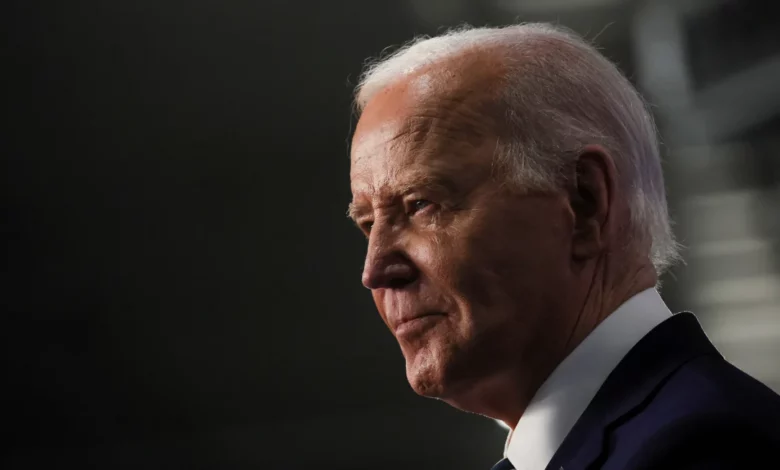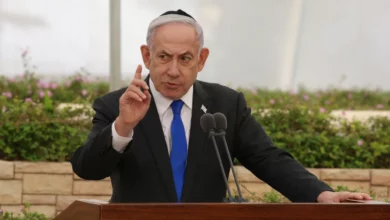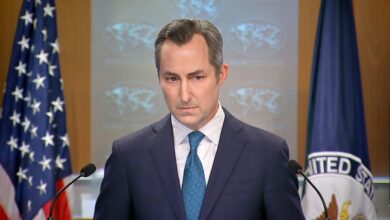
President Joe Biden’s power to engineer a swift abatement of the war between Israel and Hamas just suffered two serious new blows.
Fallout from an Israeli special forces rescue mission in Gaza, which retrieved four hostages but killed scores of Palestinian civilians, and the resignation of centrist Benny Gantz from Israel’s war cabinet on Sunday sharpened political and diplomatic dilemmas Biden has struggled for months to reconcile.
• The return of four hostages was a moment of joy for their families, and for all Israelis, and was welcomed by the United States. But the humanitarian toll of the operation underscores the carnage Israel has inflicted on civilians often used by Hamas as human shields in the war, which erupted with the radical Islamic group’s assault on Israel on October 7.
• The latest bloodshed in Gaza could further estrange Biden from progressives in his electoral coalition who are outraged at his support for Israel, its operations and its failure to do more to shield civilians. Any significant drop-off in votes from this constituency could endanger Biden in swing states where his rematch against Donald Trump could be decided by thousands of votes. The issue is especially fraught in Michigan, a potentially decisive state in November, which is home to significant numbers of Arab Americans. Vice President Kamala Harris was confronted by a protester during an appearance in the key swing state on Saturday night as she welcomed the hostage release while mourning civilians who were killed.
• The rescue mission also emphasizes the disparity in the death toll between Palestinians and Israelis in the conflict. This is likely to further isolate Israel internationally from nations horrified by the Hamas attacks and to inject further tension between Washington and its allies over the war. Around 1,200 Israelis were killed in the Hamas attacks, while thousands of Palestinians have died in Gaza.
• Gaza’s bloodiest day in six months, according to authorities there, could also further narrow the political room available to key Arab states involved in the intense US diplomatic efforts to end the fighting. Secretary of State Antony Blinken is nevertheless headed back to Egypt, Israel, Jordan and Qatar this week to try to hike pressure on Hamas to agree a deal.
New turmoil in Israeli politics
The resignation of Gantz, a retired army general who said Israeli Prime Minister Benjamin Netanyahu has no plans for ultimate victory in Gaza or what happens afterward, will have significant domestic and international consequences but is unlikely to transform Israeli politics.
• Gantz’s party is not a member of the prime minister’s governing coalition, so his departure is unlikely to immediately bring Netanyahu down. If Netanyahu were eventually brought down, it would likely please the Biden administration because of tensions with the prime minister, his refusal to accept US calls to do more to shield Palestinian civilians and his willingness to side with Republicans using the conflict to damage Biden.
• But the loss of Gantz could make Netanyahu more reliant on hard-right members of his coalition who have been pushing him for an even more intense prosecution of the war. That could raise the risks of escalation, which could intensify the simmering wider regional war in which the US is involved.
• The absence of Gantz may also create an even greater obstacle to approval of any peace deal between Israel and Hamas. Besides Netanyahu, the only remaining member of the emergency government with decision-making power is Defense Minister Yoav Gallant, also from the prime minister’s Likud party.
• The fracturing of the Israeli war cabinet and Gantz’s call for elections could have unpredictable consequences in Israel amid rising protests against Netanyahu. Thousands of people showed up this weekend in marches in multiple cities calling for the release of the remaining hostages and the chance to vote.
Biden’s Middle East problem never seems to get better
The latest twist in the Gaza conflict came with Biden in France on a trip marking the 80th anniversary of D-Day, which he used to warn of growing threats to global democracy and to toughen his political attacks on Trump and the ex-president’s increasingly obvious authoritarian tendencies.
National security adviser Jake Sullivan encapsulated the administration’s complex political and diplomatic conundrum in an appearance on CNN’s “State of the Union.” Speaking against a backdrop of the Eiffel Tower on Sunday, he told Dana Bash the US “did not participate militarily” in the operation to rescue the four Israeli hostages after a US official earlier said that an American “cell” in Israel took part in efforts to free hostages. Sullivan said US assets had been supporting Israel in helping to identify the locations of those held following the October 7 attacks.
Sullivan also reinforced US calls for a ceasefire, despite doubts that Hamas will agree to one and a belief among some Democrats in Washington that Netanyahu may seek to prolong the war to bolster his hopes of political survival. Washington has been tireless in the search for a halt to the fighting. But its failure to create a breakthrough raises questions about US leverage and Biden’s prestige on the world stage five months from Election Day.
“The best way to get all of the hostages home and to protect Palestinian civilians is to end this war. And the best way to end this war is for Hamas to say yes to the deal President Biden announced and that Israel has accepted,” Sullivan said.
“Innocent people were tragically killed in this operation,” Sullivan added. “The exact number we don’t know, but innocent people were killed. And that is heartbreaking. That is tragic.”
But the national security adviser’s comments will do nothing to ease Biden’s domestic political exposure over the war. The administration is caught between his left flank and Republicans who have strong political incentives to damage Biden and to deepen ties with their far-right ideological partner Netanyahu. The president’s impossible straddle is likely to become even more testing when Netanyahu takes up on July 24 an invitation to address Congress, which was signed by all four congressional leaders but initiated by Republicans including House Speaker Mike Johnson.
Biden has been incessantly heckled by pro-Palestinian protesters at campaign events since the war erupted, and any large demonstrations at the Democratic National Convention in Chicago in August could create poor optics and play into Trump’s narrative that a law enforcement crackdown is needed in out-of-control cities.
Sen. Tom Cotton voiced the GOP’s hardline on the conflict when he said Sunday on Fox News that he’d spoken to Netanyahu to congratulate him on the raid. The Arkansas Republican also chided “the progressive left here in America, to include The New York Times and Washington Post” for highlighting the loss of large numbers of innocent civilians killed during the Israeli operation. While casting doubt on the casualty figures, Cotton said on Fox News, “If you don’t want your people killed in hostage rescue missions, then you shouldn’t take hostages in the first place.”
Gaza’s Ministry of Health said at least 274 people were killed and hundreds were wounded during the IDF’s operation to free four Israeli hostages kidnapped by Hamas. The IDF has disputed those numbers, saying it estimated the number of casualties from the operation was “under 100.” CNN cannot independently verify the health ministry’s figures.
Israel’s political crisis deepens in a way that will test Biden
Gantz, a member of the war cabinet, said he was pulling out of Netanyahu’s government because the prime minister put personal political considerations ahead of post-war strategy for the Gaza Strip, and he called on the prime minister to hold an election. “Do not let our people be torn apart,” Gantz said. Netanyahu had called on Gantz to stay. But his departure doesn’t immediately imperil the governing coalition, which still has 64 seats in the 120-member Knesset.
The hostage rescue raid and new turbulence in Israeli politics follow Biden’s latest bid to end the war last month when he publicly laid out a three-phase peace plan that would begin with an immediate ceasefire in Gaza, the release of hostages and more humanitarian relief in Gaza. His call was endorsed by G7 leaders and was seen by some analysts as an attempt to box in Netanyahu since the deal originally came from the Israelis. In response, Netanyahu insisted the war would not end until Hamas was defeated. Hamas responded positively.
Netanyahu’s legendary staying power and the reality of the political calendar means there’s a strong chance Biden will be forced to deal with the prime minister for the rest of his reelection campaign amid a conflict that could end both their political careers.
Aaron David Miller, a Middle East peace negotiator for multiple US presidents, said Sunday on “CNN Newsroom” that the Israeli prime minister would try to run out the US political clock since the Knesset goes into recess on July 25 and doesn’t return until shortly before the US election. “I think he is going to try to buy time before then and make a judgment on how he wants to comport himself with respect to the next US president,” Miller said. “He can’t vote in our election, but if he could, I suspect if he wouldn’t be voting for Joe Biden.”
Biden has argued that Israel has degraded Hamas to such an extent that it should now begin to contemplate the security end game for Gaza. Some US experts believe it will be impossible to fully eradicate Hamas. But the group seems unlikely to embrace a permanent peace deal that would lead to it losing power in Gaza — one reason why the situation is so intractable.
“In order to beat Hamas politically, you’ve got to introduce another element here. The Saudis, the [United Arab Emirates], and the other Arab governments are willing to do it. You’re going to need some role for the Palestinian Authority,” Richard Haass, president emeritus of the Council on Foreign Relations, told CNN’s Fareed Zakaria on Sunday.
“President Biden made it clear that the United States will be a partner, but it needs Israel to pivot to that place. But it’s unwilling to, so I think what we’ll likely to see is the war in Gaza continue for some time, albeit at a lower level,” Haass added. “I think we’re looking at probably a long, slow grind in Gaza.”




